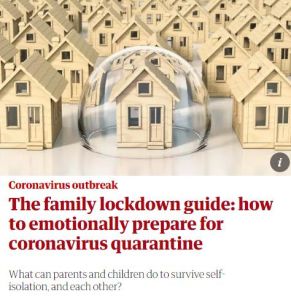Join getAbstract to access the summary!

Join getAbstract to access the summary!
Celina Ribeiro
The Family Lockdown Guide
How to emotionally prepare for coronavirus quarantine.
The Guardian, 2020
What's inside?
Maintain your sanity while confined to your home.
Recommendation
The coronavirus pandemic and government-mandated mitigation measures are confining millions of people to their homes. How can you and your family make the best out of this period of isolation? The Guardian has consulted with psychologists, and spoken to a quarantined school principal and a family of five in an Italian COVID-19 red zone to come up with some best practices. If you find yourself in a similar position, you will want to take their recommendations to heart.
Take-Aways
- As individuals and families are confined to their homes as a result of the coronavirus pandemic, their mental health may suffer.
- Under lockdown, families can take a number of steps to turn the experience into something positive.
Summary
As individuals and families are confined to their homes as a result of the coronavirus pandemic, their mental health may suffer.
As the coronavirus pandemic unfolds, in many territories individuals in contact with an infected person are self-isolating for a 14-day period. Moreover, in countries where governments shut down public schools, many families find themselves in the unprecedented position of staying together under one roof for long periods. Living without the usual daily routine while confined in their homes can trigger a number of mental health problems, especially for those already predisposed to them. Problems may include anxiety, extreme frustration and depression. Self-isolation undermines three vital pillars contributing to good mental health: a sense of autonomy, a sense of competency and a sense of human connection.
“With routines disrupted and families thrown into close quarters, cabin fever is a real danger.”
Under lockdown, families can take a number of steps to turn the experience into something positive.
Families under lockdown can take the following steps to make their experience more pleasant:
- Planning: Draw up a family contract defining challenges and determining how each family member can contribute – in their own unique ways – to overcome them.
- Communication: Discuss the situation with children in an age-appropriate way. Be open about the facts but also help them deal with their feelings and fears.
- Routine: Follow a daily schedule that mirrors your and the children’s normal routine as much as possible. Draw up schedules that include schoolwork in different subject areas, as well as time slots for reading, cooking, playing games or watching a movie.
- Exercise: Engage in regular physical activity to keep spirits up. If you can’t leave home, do some jumping jacks, run up the stairs or follow an online yoga class.
- Time Management: Take advantage of the extra time you have at home. Tackle home chores you have been putting off, such as small repairs. Plan some special family activities. Take some time for yourself.
“Families should consider things they can do together – like planning for a movie night, taking on a large project such as building something together, or even rearranging the furniture.”
- Personal Space: Respect each family member’s need for personal space. For example, you may designate different zones within your home for particular activities, such as a game zone or a relaxation corner.
- Stay Connected: Maintain contact with friends and family through social media and video calls. Enable your children to do the same.
- Personal Growth: Treat this intense period of self-isolation as an opportunity to grow. For example, the experience may give you a new appreciation for your children and may help you discover the value of slowing things down.
About the Author
Celina Ribeiro is a freelance journalist based in Sydney. The Guardian is a major daily newspaper based in the UK.
This document is restricted to personal use only.




















Comment on this summary